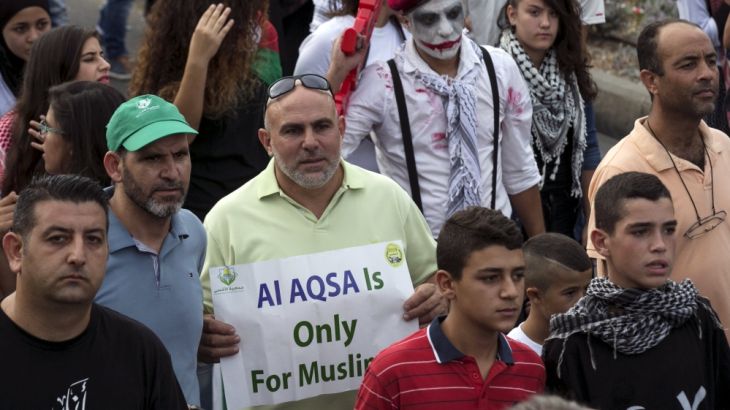Israel to impose blockade on Jerusalem neighbourhoods
Security cabinet unveils strict new measures as PM Netanyahu vows to take “aggressive steps” to stop ongoing violence.

Israel’s security cabinet has approved a series of new measures designed to combat spiralling Israeli-Palestinian violence after Prime Minister Benjamin Netanyahu vowed to take “aggressive steps” to prevent further clashes.
“The security cabinet decided several measures to combat terrorism, notably authorising police to seal off or impose a curfew on parts of Jerusalem in case of friction or incitement to violence,” the security cabinet said in a statement released early on Wednesday morning.
Keep reading
list of 4 items‘Lone wolf’ or JI?: Jemaah Islamiyah confusion after Malaysia attack
Who was behind the DRC’s attempted coup? Were Americans involved?
Russia-Ukraine war: List of key events, day 816
Other measures include deploying Israeli security forces throughout Jerusalem’s public transport network, using military units to reinforce Israeli police force and “demolishing terrorists’ homes” and revoking their permanent residency.
|
|
Violent clashes have increased in frequency since Israeli security forces began to crack down on Palestinian worshippers at the al-Aqsa Mosque compound in occupied East Jerusalem last month.
Netanyahu said on Tuesday night that “anyone who raises his hand to harm us – will pay dearly. And we will not hesitate to use all means at our disposal to restore peace to the cities of Israel”.
Mustafa Barghouti, president of the Palestinian National Initiative, a democratic political movement, said that these measures will only lead to the exact opposite results Israel is expecting in Jerusalem.
“Insanity is nothing but repeating the same thing but expecting different results. When they decide to separate East and West Jerusalem it only proves that they have failed. The whole ideas of walls and checkpoints is only deepening the military occupation,” he told Al Jazeera.
“The only way [to end the violence] is to end this military occupation, but the world is refusing to look at the cause,” Barghouti told Al Jazeera over the phone from Jerusalem.
“This is a new uprising and it will continue. We have always wanted popular non-violent resistance but Israel is the one using violence, they are allowing settlers to attack Palestinians.”
Stabbings and clashes
The security cabinet’s new measures came after another day of violence on Tuesday.
A Palestinian was killed in clashes with Israeli security forces in the West Bank city of Bethlehem, the latest such incident in nearly two weeks of violence.
Tuesday’s death of Moataz Zawahra, 28, from a Bethlehem refugee camp, takes to 30 the number of Palestinians killed, Palestinian sources said.
Earlier on Tuesday, three Israelis were killed in two attacks in Jerusalem, increasing the number of Israelis killed since the upsurge in violence that began at the start of the month, to seven.
“The feeling is becoming increasingly prevalent that no place is safe,” Al Jazeera’s Mike Hanna, reporting from West Jerusalem, said.
The spell of violence has been stirred by Palestinian anger over increasing Jewish visits to al-Aqsa.
READ MORE: Al Jazeera’s comprehensive coverage of the ongoing Israeli-Palestinian conflict
The unrest began last month with clashes at Jerusalem’s most sensitive holy site and quickly spread across Israel and into the West Bank and Gaza Strip.
The stabbing attacks have stoked concern of a new Palestinian uprising and though Palestinian President Mahmoud Abbas and Israel’s Netanyahu have appealed for calm, the violence shows no signs of abating.
Frustration has boiled over into violence as Israel continues to build Jewish-only settlements throughout the West Bank in defiance of international law.
At least 1,990 Palestinians have been injured, according to the Palestinian Authority’s health ministry, and rights groups have accused Israeli forces of using excessive force.
United States Secretary of State John Kerry said on Tuesday that he will travel to the Middle East “soon” to try and move the situation “away from this precipice”.
Kerry said the US’ goal for the region, the two-state solution “could conceivably be stolen from everybody” if violence in the region were to spiral out of control.
![Human rights groups have accused Israeli security forces of using excessive force in dealing with Palestinian protesters [EPA]](/wp-content/uploads/2015/10/603c1e9f3fca4d14a59e8ce6de7b06ce_18.jpeg)